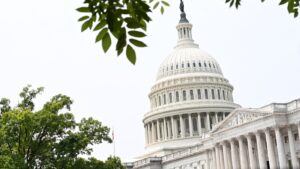The Controversial Reinstatement of Trump’s Travel Ban: Key Details
In a move that has sparked intense debate, President Trump has reinstated a travel ban affecting multiple countries. This decision, announced on Wednesday, restricts entry for travelers from a total of 19 nations, with the restrictions taking effect on Monday, June 9.

Tasos Katopodis/Getty Images
The White House defends the ban as a necessary measure for national security, citing inadequate screening and vetting processes in the affected countries. The full ban targets Afghanistan, Burma, Chad, Republic of the Congo, Equatorial Guinea, Eritrea, Haiti, Iran, Libya, Somalia, Sudan, and Yemen. Meanwhile, a partial ban affects citizens from Burundi, Cuba, Laos, Sierra Leone, Togo, Turkmenistan, and Venezuela.
President Trump highlighted a recent attack in Boulder, Colorado, as a justification for the ban in a video statement on social media. “In the 21st century, we’ve seen one terror attack after another carried out by foreign visa overstayers from dangerous places all over the world,” Trump stated.
Shawn VanDiver of #AfghanEvac, an organization aiding Afghan resettlement in the U.S., expressed concerns over the ban’s implications. Although there are exceptions for special immigrant visas for Afghans who worked with the U.S. government, “tens of thousands of Afghans with pending cases—especially family members—will now be blocked from reaching safety, regardless of their loyalty to the United States or prior vetting,” VanDiver explained.
The Origins and Evolution of the Travel Ban
This latest ban stems from an executive order signed by Trump upon returning to office. The directive tasked agencies with identifying nations lacking adequate vetting procedures. Trump also indicated a desire to review visas granted during the Biden administration.
The initial travel ban, introduced shortly after Trump’s inauguration in 2017, targeted seven Muslim-majority countries. Although initially temporary, the ban faced legal challenges and underwent several revisions. Ultimately, the Supreme Court upheld a revised version in 2018.
In contrast, President Biden rescinded the travel ban on his first day in office in 2021, underlining a shift in policy with a proclamation titled “Ending Discriminatory Bans on Entry to the United States.” Nonetheless, Trump’s recent actions signal a return to his previous approach.







Be First to Comment